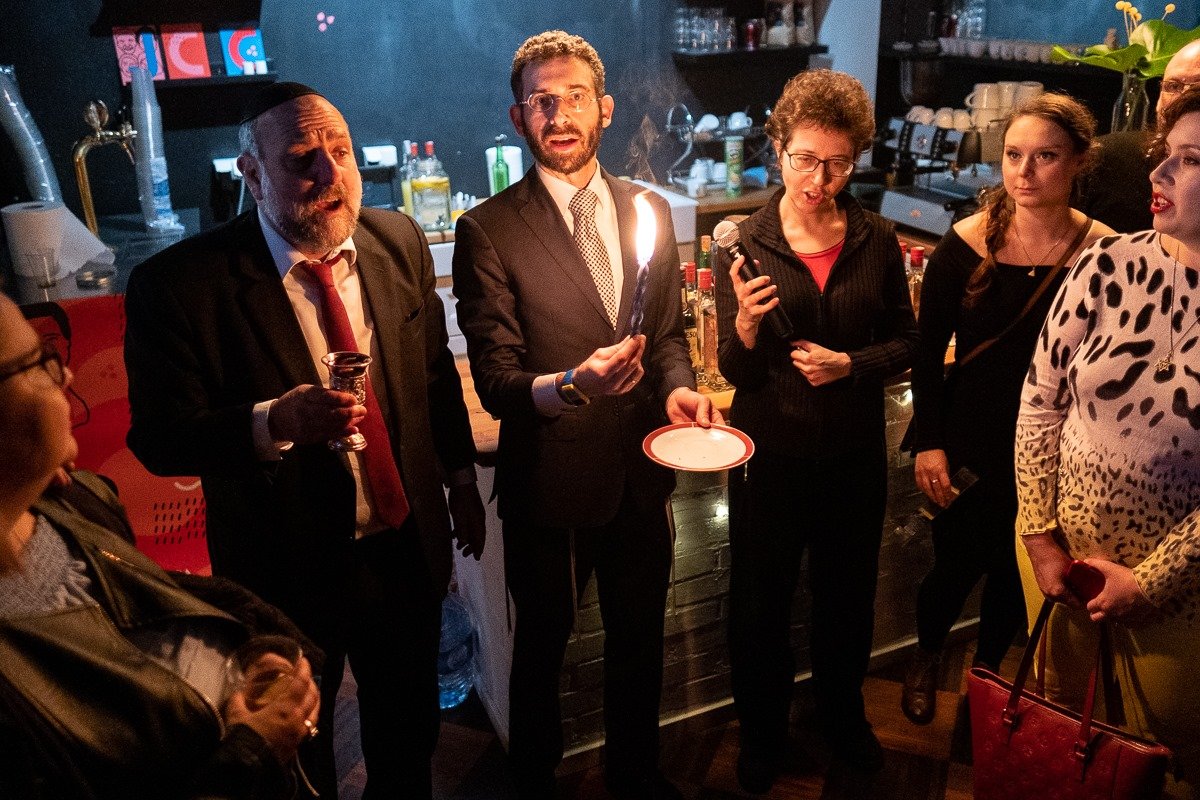A Rabbi in Poland: Mission Accomplished
It’s been almost 13 years since Rabbi Yehoshua Ellis was appointed to serve as the emissary for Shavei Israel in Katowice, Poland, and he, and his wife, Raissa, made the move there from Jerusalem. After 5 years in Katowice and 8 in Warsaw, working side by side with the Chief Rabbi of Poland, Rabbi Ellis has completed his mission there – and truly made his mark in the country.
Born in Kansas City, Missouri, Rabbi Yehoshua Ellis studied at various Yeshivot in Jerusalem before receiving his rabbinical ordination from the Shehebar Sephardic Center. He is also a certified Shochet, or ritual kosher slaughterer. Twenty years ago, he served as a community volunteer in Warsaw, where he developed a powerful bond with the Polish Jewish community and decided to devote himself to strengthening it.
Ellis saw that they needed rabbis in Poland so he thought he’d become one to help fill that need. While in yeshiva studied to become a rabbi, he would go to Poland during the breaks for Jewish holidays and lead services there. In 2007 he met Raissa in Poland on one of his regular stints leading holiday prayer services. They were married the following year in Jerusalem where they remained for two years while he finished his rabbinical ordination.
In 2010 the young couple moved to Katowice where he became the rabbi. Their two children were born there. Daniel is now 11 and Chana is 9. Once children came, education became a concern because there was no Jewish preschool there. By the time Daniel was around 3 they moved to Warsaw. But Rabbi Ellis never stopped serving as Katowice’s city’s chief rabbi where he worked to strengthen the local Jewish community while also reaching out to the “hidden Jews” throughout the area, many of whom were looking to reconnect with the Jewish people.
Meanwhile, in Warsaw Rabbi Ellis helped the community to run, working closely with Chief Rabbi Schudrich throughout. His functions included logistics, teaching and pastoral work. Whether it was making sure there were prayer services, organizing a Passover seder for 300 people, or running life cycle events – there were always many things to handle.
“Shavei helped to give a lot of wonderful tools,” Rabbi Ellis pointed out. “Whether it was printed materials, financial support, organizing programs – their dedication was unwavering. Sometimes they helped more, sometimes less, but you could always count on them. And it’s not just that they provided resources but wisely applied resources.”
Another major responsibility he had was dealing with the Jewish cemeteries in Poland. This was no small task as there are over 1,400 Jewish cemeteries there! Plus unknown numbers of mass graves. His official title in this regard was the Director of Rabbinic Commission for Cemeteries and it was a big job in and of itself. For example, sometimes bones dug up when excavating for a building project. And then it was Ellis’ responsibility to research the area, find maps, and do what he can to prove there was a Jewish cemetery there in that location and fight to prevent building on it. Sometimes with success, and sometimes, unfortunately, not.
Of course those bones that were uncovered are far from the only ‘hidden’ Jews he encountered.
The “Hidden Jews” are a phenomenon that has gained in strength in Poland in recent years, with many Jews slowly returning to Judaism and the Jewish people. Many of these Jews lost all contact with Judaism due to the extreme antisemitism they encountered after the Holocaust, and some of them even converted. Others concealed their Judaism from the Communist authorities and now feel free to resume their true identity. Another phenomenon pertains to Jewish young people who were adopted by Catholic families and institutions during the Holocaust. They were told nothing of their Jewish identity, and only in recent years have they gradually begun to discover it. Today around 4,000 Jews are registered as living in Poland, but according to various estimates, there are tens of thousands of others who have concealed their true identity, or are simply unaware of it.
Rabbi Ellis explains that almost no Jews in Poland grew up knowing they’re Jewish. “Pretty much NO Jews were born into a house where both parents were Jewish,” Ellis explains. “So it’s a very unstable Jewishness – it’s who they are but not necessarily who they’ve always been. They’re unstable about their Jewishness.” (His own wife’s story was unique – they were connected to the Jewish community though secular and many were communists.)
He has so many stories about how people came to connect with their Jewishness. Like one man who grew up really liking American Jewish comedians. When the man was 8 or 9 years old he said to his father, “Dad, why can’t we be Jewish?” To which his father answered, “You ARE Jewish.” And this story is typical.
He went on to speak about of the most unique such experiences: “There was a man I met; he was around 60, maybe older. He found out his mom was Jewish when he was 40. We met because I was helping another Jew who needed food and they were arranging it. His mother lived through the Holocaust and she hid her Jewishness until her was son 40. Occasionally I would see him in the Jewish community and I met his mother a few times. She was an older woman with limited mobility. They would go to the kosher store under the synagogue to buy challah ‘for Friday’ (i.e. not even ‘for Shabbat’). I asked her if she was ever in the synagogue and she said she hadn’t so I offered her a tour. She came in, clearly moved. I brought her to the Torah ark and she stood there looking, with great emotion, at the Torah scrolls. Then she leaned in and kissed one of the Torahs… both her son and I could not stop crying.”
Rabbi Ellis thinks wistfully about the things he will miss about his work in Poland. “The people,” he declares. “Not the community. It’s NOT a community – it’s a conglomeration of people. Not the same at all. As a Jew there, you feel essential. Also, there’s so much unexpectedness there. You never knew when you would get a phone call from anywhere in the world. It could be someone needing help right now like at the border (the war, etc). At any moment things can change completely. So many opportunities to help Jews… not even necessarily from Poland. Refugees, people needing help with the cemeteries, so many things.”
When the Ellis family moved to Warsaw, one of the first thing Rabbi Ellis remembers doing with his son Daniel was bringing him with to help him bury bones. Daniel was three years old at the time. And he appreciated it! But he had no Jewish friends which got harder and harder as the kids got older. “However,” Ellis remarks, “the kids got a very deep Jewish identity; it’s a huge foundation of who they are – they’re Jewish. The whole experience in Poland made tour family very strong.”
And yet, there are gaps. It’s not easy to provide your children with the Jewish education you value in a place that doesn’t have the type of community necessary to support that. The Ellises taught their kids to pray, for example. “I would sit next to them,” Ellis recalls, “and say the words louder so they would hear. And now they LOVE to pray – something I myself never did. But at the same time they can’t actually read the prayers.”
And so, at long last, the time had come for the family to move on. They are currently in Montreal, Canada, planning their next steps. Meanwhile, when the kids walk down the street and see a visibly identifiable Jew, they get very excited. It’s going to be very different for them now. But the memories of the tremendous things they did for for all those years in Poland should serve them well.
By Laura Ben-David
-

- Rabbi Ellis with his children, and Chief Rabbi Schudrich at the Warsaw JCC
-

- Photo: Asia Sidorowicz
-

- Rabbi Schudrich (seated) and Rabbi Ellis at Nożyk Synagogue. Photo: Laura Ben-David
-

- Photo: Asia Sidorowicz
-

- Photo: Asia Sidorowicz
-

-

- Photo: AP.ART
-

- Photo: Renata Zawadzka-Ben Dor
Comments
comments



















